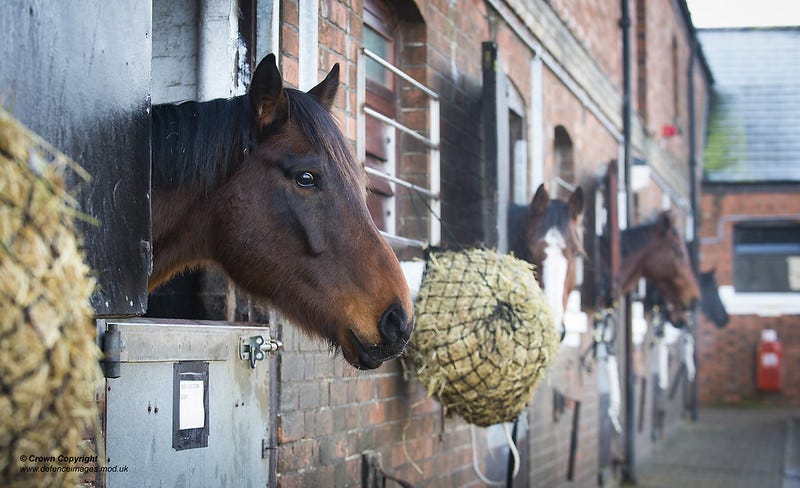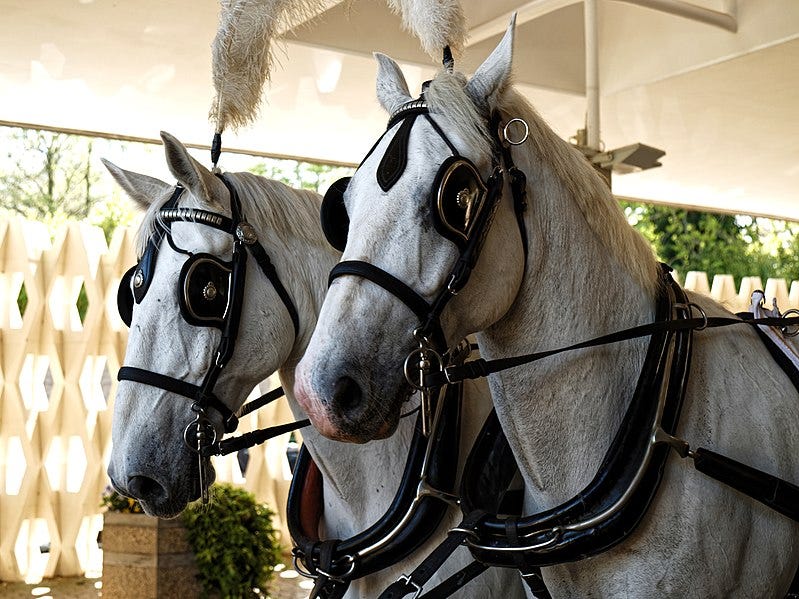It took me an embarrassing number of lockdown walks to notice the old road signs on Tooting Common warning of horses and riders. Have I ever seen a horse there? I have not. These are ghosts of London’s past, and ones that are trickier to upcycle into flower beds than the drinking troughs still found in parks across town.
London went from a horse-powered city to a motoring one almost overnight. Shire horses – the “white vans” of the Victorian era – dug out the Tube tunnels that would make them obsolete. There are Facebook groups memorialising stables that used to operate in my area of south London, Brixton Hill and Streatham, while Clapham Common held an annual pony show throughout the 1970s. Now it is as if London has emptied itself of horses, occasionally magicking them up for police and pageants. Yet if you look more closely, London’s equine heart is still very much beating, not least in its inhabitants.
“I was one of those kids that liked trying everything, but horse riding was the only thing that really stuck,” says Ebona Eastmond-Henry, 41, who works for Snapchat. Her unhorsey father used to take her to Willow Tree Stables in Lee on Sundays. “It was just a nice bonding thing with my dad. Surprisingly, he quite enjoyed it because he said it used to remind him of being in the countryside in Jamaica. He was like, ‘Even though you're a city girl, you're really a country Jamaican girl’!”
Similarly, the pony gene skipped much of my family before settling on me. My dad used to drive me up the A3 from Raynes Park to Cobham for weekend lessons: after 15 years, watching Team GB riding in Greenwich during the Olympics got me googling riding stables again.
My renewed fascination made me notice horses that had always been here. They are the traveller ponies stabled round the back of the Croydon IKEA, and the funeral corteges from T Cribb & Sons, with their matching pairs of black Friesians trotting through town with plumes tucked into their browbands. “Sometimes I’ll be in Bow and hear a clip, and my ears will prick up,” says Eastmond-Henry.
No longer having my dad on hand, I travelled to riding schools on bus routes in Dulwich and by the Piccadilly Tube line in Oakwood. While writing a blog about London riding, I got to try the King’s Troop horses in Woolwich - several named, magnificently, after Transformers characters. I went to a glorified multi-storey car park next to Hyde Park to watch the horses of the Household Cavalry pinging around their indoor school.
The King’s Troop horses are stabled in Woolwich, with a vast model cannon outside the perimeter reminding you they’re serious business horses, not horses of leisure. I had several lovely rides on Megatron who was infinitely more docile than his villainous name might otherwise suggest. On the other hand OP - Optimus Prime - was a massive prima donna.
You can ride the military horses through the Civil Service Riding Club or Riding Club London but, to be a regular ‘civi rider’, as the civilians are called, you need a recommendation from a serving officer. You should also have the stickiest bum this side of the Olympics: the horses are very fresh first thing, and therefore inclined to the odd display of fireworks.
Being well-practised in riding something more alert than the usual riding school pony is a sensible requirement. The civi riders are who you will see riding out the Household Cavalry horses before dawn in Hyde Park, neatly dressed in tweed jackets and cream jodhpurs as though off to a show – this is a required uniform for the privilege of riding out, rather than a fashion statement from the 1950s.
I personally bought all my kit off eBay, having been scorched by the last remaining horsey shops in London, which were fun but extortionate. Luckily, Instagram connected me to a wider community of horsey men and women who tipped me off to less spendy possibilities, such as volunteering at Ebony Horse Club in Brixton, or watching the autumn London Riding Horse Show, which brings riders from all areas of the city together in Hyde Park.
“People have a perception that little girls fall in love with horses, but adults can too – and grown men, for that matter,” says Natalie O’Rourke, 46, who has managed Park Lane Stables in Teddington for 14 years and was awarded an MBE last year for her outreach efforts.
O’Rourke is mindful of stereotypes of riding as being for posh people – her new book, Only Heroes and Horses, tells the story of raising £1.3million to buy the stables’ premises when their landlord issued an eviction notice after lockdown. “I wasn't born on the back of a horse, my parents have never touched a horse,” she says. She learned to ride at an animal rescue centre in Birmingham after a pony ride at a school fete got her hooked: “Horses are for everyone.”
Park Lane Stables is also one of London’s leading Riding for the Disabled Association (RDA) centres, which offer riding and carriage driving lessons to children and adults. The therapeutic aspect of horse riding was something I’d always appreciated, but never understood. When I was diagnosed with ADHD in 2020, I got an answer for why so many feelings came up for me when I was on horseback, whether worrying about things going wrong, or bursting into tears if I became overly anxious.
“Horses move things very, very quickly,” says Dr Andreas Liefooghe of Operation Centaur, a centre in Richmond Park which offers equine-assisted psychotherapy to patients experiencing issues ranging from trauma to addiction. “I used to see people month after month in offices - doing the work in the open air, we get to the same place much faster. Horses don’t use language but they’re great communicators.”
Certainly, being around horses can change your life for the better. It’s all about “that sense of childlike wonder”, says Eastmond-Henry. “If you are one of those people that does have connections with animals, or horses in particular, it's such a magical experience.”
I was put on the waiting list for a hip replacement last year and became really depressed. In January, I signed up to Operation Centaur’s sharing scheme, where people get a weekly ride on one of the therapy horses, which also gives the horses a rest from their job. A gentle hack around the park perked me up like 100mg of Sertraline, with the welcome side effect of making the wait for an operation date more bearable.
“We’re used to a world where we’re in the centre,” says Dr Liefooghe. “What we do here is put the horse in the middle. It’s almost like getting a little holiday from yourself”. In a very obvious way, horse riding brings you closer to nature, but it also makes you observe it, and yourself, in ways you aren’t usually able to. However nervous you might be as a person, the experience of a flight animal who is letting you ride, brush them and lead them is uniquely soothing.
Being around horses just seems to make everything better, however you do it. “I can't swim. I hate everything about swimming! But I tried it,” says Natalie O’Rourke. “So just try riding, and if you don't like it you've had a go, and if you do…”
But, especially in London, enjoying horses doesn’t have to involve riding, or even getting up close. There are competitions and parades to watch, of course, but also volunteering options that require a wide skill set. “So many RDA places need help with social media. You bet your life there's an 80-year-old woman somewhere who’s never heard of Facebook. You could help her to keep going for another ten years.”
If more of us took this up, those west London stables might never have had to close – as it is, there are plenty of Londoners working hard to keep horses in the city for another hundred years. And those Shires that the Tube replaced? You can see them even now, mowing the grass in the Royal Parks.
Kat Brown is a freelance journalist and social media editor. You can find her here & here.




